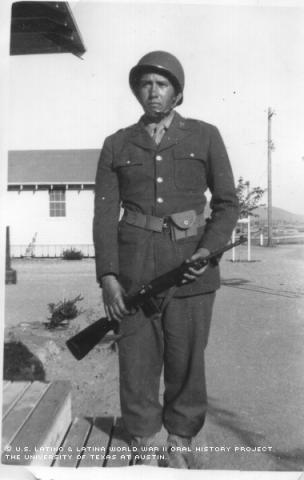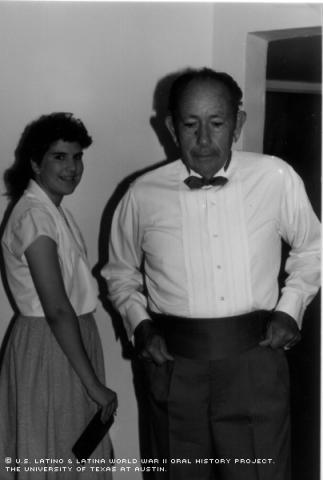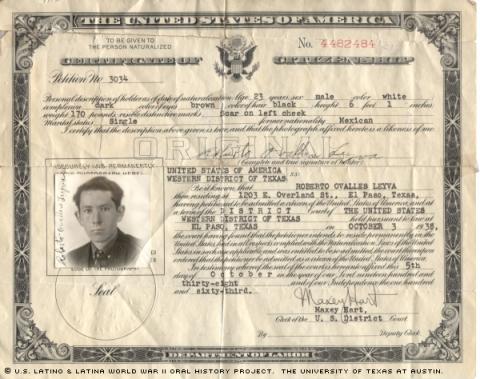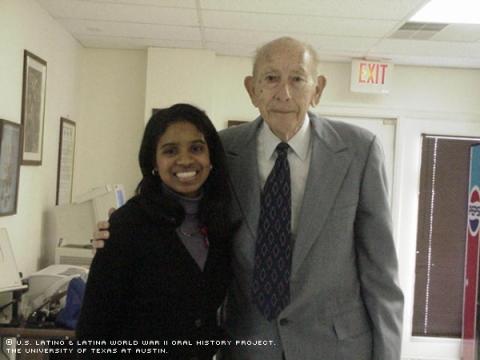



By Andrea R. Williams
In the midst of conflict, Robert Leyva sometimes would think the enemy troops killed in World War II could have been among his friends in another time and place. This kind of love of mankind is a mainstay in Leyva's life.
Leyva was born into poverty in Chihuahua, Mexico, on May 10, 1915, to parents who were poor farm laborers. At age three, he's been told, Leyva's father, Jesus, left the family. At the age of five, his mother, Justina Ovalles Leyva, took his brother, Jesus, and sister, Justina, to El Paso, Texas.
Even after leaving Mexico, the family still lived in poverty, living on the city's south side while his mother continued to work as a farm laborer. While his mother worked, the Leyva children attended Alamo Elementary School.
Leyva continued his education at Bowie High School in El Paso, excelling in athletics. Sports changed his life -- even off the field. First, he met his future wife, Bertha Garcia, at one of his high school football games. After two years of courting, the two married in 1943 and eventually had five children: Yolanda, Martha, Robert Jr., Roy and Patricia.
Texas College of Mines, now known as the University of Texas at El Paso, offered Leyva a full athletic scholarship. He’d studied physical education, and dreamed of becoming a professional athlete.
But WWII interfered with those aspirations.
The U.S. Army drafted Leyva in early 1944 after he’d attended only one year of college. He left El Paso for basic training at Camp Roberts, Calif.
This wasn’t Leyva's first time in California. Years before, as a 17-year-old, he’d hopped trains, riding the rails cross-country looking for farm work. Trains carried him to places like San Francisco and Chicago.
After basic training, Leyva went to Camp Gordon in Georgia. From there, the Army sent him up the East Coast to New York, from where he was shipped across the Atlantic to England as part of the 254th Field Artillery Battalion’s service battery (155mm Howitzer, nondivisional). Leyva was then sent into combat in France on Oct. 1, 1944. Trained on the 155-mm Howitzer and in rifle marksmanship, Leyva fought in the Battle of the Bulge in the Ardennes, in the Central Europe Campaign and in the German Rhineland.
"We felt kind of sorry for the enemy, 'cause they could have been a good neighbor if they had lived here with you in the States," he said.
Although he was trained on the Howitzer, he was never assigned to use the weapon. Throughout his stint, he served in three separate batteries, all as an ammunition handler.
Fortunately, Leyva was never seriously injured while in the war, but he did suffer a minor injury in a truck accident. Medical attention was unavailable for 20 days, however, and by that time, he was healed. In October of 1944, he earned the rank of Private First Class.
Leyva ultimately earned the EAME Campaign Medal with three Bronze Stars, as well as the Good Conduct Medal, Victory Ribbon and two Overseas Service Bars.
After being discharged in December of 1945, he completed his Bachelor's Degree at Texas College of Mines. He then went on, in 1953, to earn his Master's degree from the same institution, which had been renamed Texas Western College in 1949. He noted in a later conversation that he paid for his education "... out of my own pocket. I didn't get any help from anyone."
The grind of combat took its toll on Leyva. With the deterioration of his physical stamina went his dream of becoming a professional basketball player. He’d excelled in athletics in high school and had played basketball in college, but the soldier returned from the war battle weary.
"When I came back, I couldn't do anything -- I couldn't even play marbles," he said with a chuckle. He pursued his other desire, becoming a coach.
Leyva taught physical education for 45 years in the El Paso Independent School District. He also worked part time with the city's parks and recreation department for 50 years, retiring from that job in 1998.
The man who earned accolades as a soldier earned more recognition in his post-war life upon his retirement: For his service to his hometown, the mayor of El Paso awarded Leyva with the Conquistador Award -- the highest honor bestowed by the city of El Paso.
Mr. Leyva was interviewed in El Paso, Texas, on February 2, 2002, by Andrea Williams.

